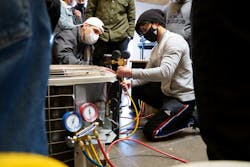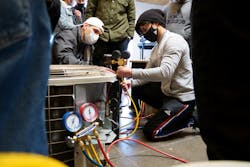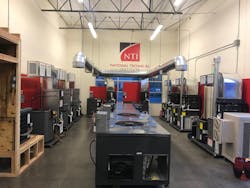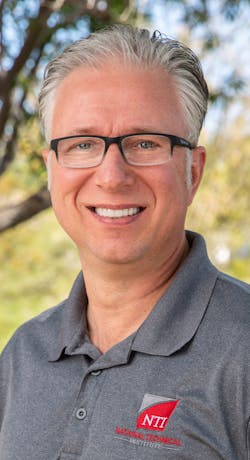Trades Education is Better When Contractors Are Involved
Have you ever hired an entry-level technician through a trade school, high school program or a community college? I would guess that many of you have. I have done this too, often hiring graduates from various types of programs when I owned my own HVAC contracting business. With the trade skills gap increasing every year, it’s become tougher to find knowledgeable employees. So when you find new graduates, you jump. But, when these “educated” employees start the job, what do you discover about the way they were trained? What I’ve experienced, is that a good portion are not ready to handle many of the common tasks and issues that arise on a daily basis.
You’ve probably scratched your head and asked: How could this happen? I know I have. It’s really not the student’s fault. They learned what they were taught, and many I hired had done well with their trade school training. What I’ve learned is that the accountability falls on the school, specifically the curriculum they are teaching and how they are teaching it.
Real World Training
Unfortunately, many training programs are not geared toward real world jobs. That's because it is mostly curated by academics and not actual peopleThe importance of input by contractors, the people who will actually be hiring these graduates, cannot be overstated.
The importance of input by contractors, the people who will actually be hiring these graduates, cannot be overstated. During my time as an HVACContractor Involvement
I found teaching hands-on experience using real world scenarios was the best way to get students prepared for working in the field. Contractors providing input toward trade education can only benefit the contractors. Think about it: the end user of all this education is, for the most part, the contractor. Why not help build a curriculum that creates the desired results you need?
The end user of all this education is, for the most part, the contractor. Why not help build a curriculum that creates the desired results you need?
Many trade schools have advisory boards that meet one to three times a year. That's not a very intense commitment, but it is one that can have a large payoff. By providing input to the curriculum, not only would you get students who are ready to work, you would also get first pick at the graduates while you are working with the school. No doubt, this could help with your competition.
Community Relationships
Building community relationships to find the best hires requires reaching out to the leaders of your community’s high schools, community colleges and trade schools. After building relationships, these programs are more likely to keep you in mind when they promote graduates who are looking for jobs.
Let’s face it, the pool of qualified job candidates is quite small, creating a recruiting challenge for most companies. If you want to grow your business, you need to recruit and train a team. But you can’t just hire anyone. You need to hire the right people — talented professionals who will represent you in the right way to your customers and prospects.
Anything you can do to tip the scale in your favor can only help. Getting involved in the actual education of your future employees can be a great way to find talent in both the short and long run.
Chris Roth is the CEO and owner of National Technical Institute (NTI) a state-approved trade school with campuses in Las Vegas , Nev. and Phoenix, AZoffering fast-track training in HVAC, plumbing and electrical. NTI’s mission is to produce problem solving, creative thinking graduates who possessAbout the Author
Chris Roth
Owner CEO
Chris Roth is the CEO and owner of National Technical Institute (NTI) a state-approved trade school with campuses in Las Vegas , Nev. and Phoenix, AZ offering fast-track training in HVAC, plumbing and electrical. NTI’s mission is to produce problem solving, creative thinking graduates who possess NTI industry-standard knowledge and skills for a long-term, promising career. Roth is a licensed HVAC contractor. NTItraining.com



